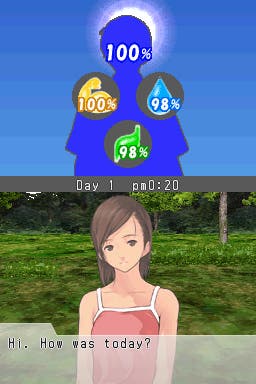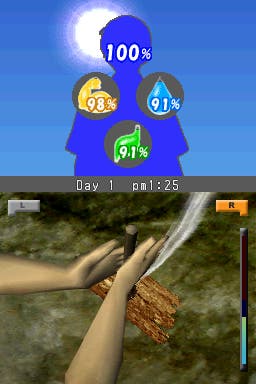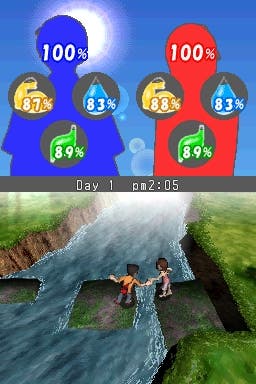Lost In Blue
Paradise isle, or parasite bile?
It was Enid Blyton who had me fall in love with adventure. It’s easy to mock the crazed old loon, and indeed it’s necessary to look harshly upon her casual racism, but even though she wasn’t a particularly good wordsmith, she could sure as hell tell a story.
The Famous Five is the name that leaps first to most people’s minds, but for me the stand out stories were the short-lived tales of The Adventurous Four, and the ...Of Adventure books. Both The Adventurous Four, and The Valley Of Adventure, featured stories of children stranded in the wild, foraging to survive. There was something primal, a base response in my under-developed mind that made these stories vivid and romantic, such that I dreamed of being the survivor of a crashed plane in a lost valley, or washing up with a shipwreck onto the beach of a deserted island. Of course, these locations would be re-appropriated by my maturing imagination a few years later, this time with one more survivor to keep me company. And even today such a circumstance fulfils the role of "my happy place". Lost In Blue would thus seem just about the most perfect subject ever.
Everything begins with the inelegantly named Keith washing up onto a beach, after his boat sank in the storm. His life is put into your hands; the left one on the D-pad, the right asked to manage the buttons and the stylus. And brilliantly, there are no instructions. You just have to let instincts kick in. The top screen shows you Keith’s four stats, his overall HP, strength, and need for food and water, the bottom the action with Keith and his new temporary home. It quickly becomes obvious that you’re going to need those human basics - food, fresh water, and shelter, and you get to business exploring the area to finding out what you’ve got. It won’t take long before Keith stumbles upon Skye, a girl about his age (guessing they’re older teenagers). And then in an excruciatingly heavy-handed gameplay-force, he stumbles upon her glasses, thus rendering her near-blind. She’s now dependent upon you for all her movement.
Together now, you forage about until you find the cave that will represent your home for the duration of your stay. There’s hay to sleep on, there’s a place to store equipment, room for a fire, and places to cook food. However, if Skye wants to leave, she’s going to have to come out with you.
This does mean that Lost In Blue is the second game in the whole history of ever to feature a "Hold Hands" button - a feat only previously achieved by the unsurpassed wonder of Ico. However, where in Ico there is something heart-achingly beautiful about this small boy giving his all to help the defenceless, but much older ghost girl, in Lost In Blue it just feels misogynistic. Skye’s inability to move independently renders her Keith’s live-in servant. Her role is to cook, sew, and make baskets. Blyton would stand on her chair and applaud. Those of us who were born after1950 will shake our heads in disappointment.

There’s something very interesting about the mindset behind these development decisions. It cannot be ignored that being stranded on a deserted island with a single member of the opposite sex is something of a fantasy situation. Think The Blue Lagoon and carefully placed barrels. This is Nintendo, wholesome family entertainment, and so clearly Hold Hands is the raunchiest button on offer. But you can’t help but think that the sexual frisson has been taken reductio ad absurdum and rediscovered old-fashioned gender roles of Man Hunt and Woman Cook and Clean. Skye can’t climb onto a log without Keith valiantly scooping her up in his arms and gently placing her on top. Keith wouldn’t even think about cooking any of the fish he’s caught, and instead sits on the cave floor doing absolutely nothing when Skye is charged with preparing food. We’re hopefully now enlightened such that this all feels sinister.
These antiquated attitudes aside (and they never are), Lost In Blue is about surviving. And that’s fascinating. Think the mechanics of a Harvest Moon, but where harvesting carrots is a matter of life or death. In fact, micromanagement of your day is the key to staying alive, requiring that you get enough water, food, firewood, tools, supplies and sleep to keep going, all in the short time given to each day, each factor heavily dependent upon the other. They cannot sleep if they are hungry, or if there’s no fire to keep them warm, and they cannot explore if they are too tired, or too thirsty.
Food grows wild about the island, and is occasionally dug from the ground by pointless scratching with your stylus. Better use of the screen comes when fishing or hunting, using the primitive weapons you fashion from collected objects. A straight stick and a sharpened stone make a spear, which can be used to hunt fish in the stream. As the slippery devil flicks by, stab the stylus onto him to spear and collect. Traps can be built using Skye’s baskets, woven from bamboo you collect. Even furniture can be fashioned via a peculiar minigame involving drawing gestures on the screen. Water can be drank from the stream, and then later stored in a barrel in your cave. As things progress, your lives become more cosy, the cave more homely.

Were Lost In Blue to actually give you the freedom it implies, it would be utterly joyous. A whole island to explore, taking a good game-day (a minute of real-time lasts an hour in-game) to travel from your cave to a far-flung edge, and the nest-building cosiness of survival. But deeply frustratingly, it’s very badly balanced. With an hour passing every minute, and a need to sleep about eight hours a night, each day passes in about quarter of an hour. In that time you need to hunt and gather meat and vegetables, prepare and eat two meals, gather firewood, source water, find salt and spices, make tools, gather raw materials for building, and at the same time do the same for Skye, who is so hopelessly co-dependent that she can’t even drink from the stream she’s stood next to without your holding her hand. Their appetites are astonishingly huge - eight fish can be eaten between them, along with coconuts, mushrooms, potato and some flavours and spices, and they’ll only satiate about 30 per cent of their daily hunger. Utterly insane.
There simply isn’t time. The motivation is to explore. The cave is on one side of the island, and mysterious greyed-out areas surround. Accessing them often involves rolling logs to make steps, climbing about, and jumping from place to place. But there are times when a task requires both of you, such as moving a particularly heavy rock blocking the path. This requires dragging Skye behind you, carrying her over every obstacle, and arranging the environment so that her feeble she’s-only-a-girl body can cope with the nigh-impossible task of climbing up a slope. This takes so much energy, requires so much raw food to be gathered and consumed, and awkward power-naps in the middle of fields, that it’s never anything but a horrible chore. What should be the most exciting part of the game is always a matter of life-threatening scraping through, in the least realistic manner imaginable.
The limited inventory is realistic, but frustrating. Because you’re required to gather quite so many supplies on a daily basis, the majority of the game is spent trudging back and forth between the cave and the nearest site for wood, coconuts, water or whatever materials are required. The unrealistic speed at which time passes renders what might be mindless tasks to fill the first hour of each game-day, into chores that mean you get late to bed. If you intend to explore anything of the place, it’s going to take two days of preparation, and even then you’ll most likely die if you try and spend the night away from the cave.

If I were stuck on a beautiful deserted island, there would be days when I’d play in the sea. Or lie around in the sun. Or if I were there with a girl, convince her to strip off and run around with me, before we roly-polied down a hill together, and then somehow ended up kissing. Because it doesn’t take me seven hours to pick potatoes, cook and eat them. Let alone five of them and still be hungry.
Lost In Blue is not without charm, and not broken beyond redemption. In fact, it’s very complete. The freedom it offers is huge, and if you wanted to, you could just spend your days fishing and sleeping without complaint. If you want to run to the other side of the waterfall and hunt deer with your bow, then that’s possible. Or maybe you want to plod around the abandoned ruins picking radishes, dandelion and burdock, and dozing in the sunshine - that’s fine. Of course, you will end up dead if you spend too much time away from the cave, despite (ARRGGHHH!) there being another cave near all the interesting stuff, perfectly adequate for sleeping in with its own fresh water source. That they point blank refuse to recognise.
Now, I’ve not watched Lost, so I’ve no idea about all that Monster In The Woods stuff everyone bangs on about [Um, nor do we, really - Lost fan Ed]. I tried to watch it, but it was like a cross between the O.C. and Celebrity Love Island [Sacrilege! Right! Fired! - Ed], and my ears started bleeding. But still, it would have been interesting if Lost In Blue had eventually revealed some sort of massive-o-mystery, or similar. There’s some mumbled story about the island, but never quite the OH MY GOD WHAT IS THAT?!! excitement that could have been possible. Yes, it’s not that sort of game. But at the same time, it’s not really the sort of game it claims to be either.
So here’s the thing. It’s playable, and it’s delightfully novel. And for the first few times there’s almost something involving about spending an entire day preparing for the following day’s trip. This becomes somewhat less engaging the thirteenth time you have to do it, just because no straight sticks happen to fall near your cave. Having the commonsense to put movement on the D-pad is to be commended. Messing up the stylus/button combination is to be poo-pood. Back and forth and back and forth. And the painful sexism at the core might be enough to put some off completely. However, it still achieves that magical island feeling. That sense of creating security from the environment, of making home, of surviving, is enticing and exciting. But if only it would just give you the time to play it.

